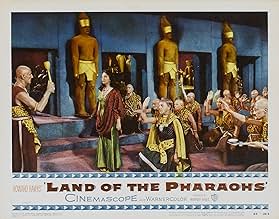Alexis Minotis(1898-1990)
- Actor
- Director
- Producer
Alexis Minotis was a Greek actor and theatrical director from Chania, Crete. He was notable for producing and directing modern theatrical versions of ancient Greek tragedies such as "Hecuba", "Antigone", "The Phoenissae", "Prometheus Bound", and "Oedipus at Colonus".
Minotis was a published poet during his teen years, with some of his poems published through the literary magazine "Dionysus". As a young adult, he worked as a bank employee. He found his regular job to be rather boring, and he started appearing as an amateur actor in theatrical shows by 1921. He soon decided to become a full-time actor, and he found work in acting troupes which needed additional members while traveling throughout the country. His father reportedly disowned him, and Minotis was considered the "black sheep" of his family for years.
In 1925, Minotis was hired as a new member for the theatrical company of Marika Kotopouli, a leading actress of the era. He remained with this company until 1930, and he gained considerable fame as a tragic actor. He left in order to join an avant-garde acting company. He made his film debut in 1930, portraying a character in a pastoral romance.
In 1940, Minotis married his fellow actress Katina Paxinou. They went on to appear as an acting duo in many productions at the National Theatre of Greece in Athens. Minotis fled from Greece during its occupation by three Axis powers during World War II (Germany, Italy, and Bulgaria), and he spend several years living abroad.
In 1946, Minotis was cast as a butler in the American spy film "Notorious" by Alfred Hitchcock. It was Minotis' first appearance in an English-speaking film. His subsequent film appearances included the domestic abuse-themed film noir "The Chase", the fantasy film "Siren of Atlantis" (1949), the historical drama "Land of the Pharaohs" (1955) about the reign of the Pharaoh Khufu/Cheops, and the adventure film "Boy on a Dolphin" (1957), which was the first Hollywood production filmed in Greece.
By 1955, he started his famous adaptations of the works of Sophocles and Euripides. The plays were originally performed at the Ancient Theatre of Epidaurus, but Minotis soon went on a long international tour with his acting company. He both performed and directed most of these plays for American audiences in New York City. In 1958, he directed the French opera "Medea" by Luigi Cherubini for the Dallas Civil Opera. It was considered a highlight for his career as a director.
In 1973, Minotis portrayed Abraham in a play depicting the Sacrifice of Isaac from the Book of Genesis. During the 1970s and the 1980s, Minotis appeared infrequently as an actor in regular Greek theatrical seasons. He continued to hold directorial and administrative posts in theaters throughout this era. In 1989, he returned to the role of Abraham for his final season of performances. He died the following year at the age of 90.
Minotis was a published poet during his teen years, with some of his poems published through the literary magazine "Dionysus". As a young adult, he worked as a bank employee. He found his regular job to be rather boring, and he started appearing as an amateur actor in theatrical shows by 1921. He soon decided to become a full-time actor, and he found work in acting troupes which needed additional members while traveling throughout the country. His father reportedly disowned him, and Minotis was considered the "black sheep" of his family for years.
In 1925, Minotis was hired as a new member for the theatrical company of Marika Kotopouli, a leading actress of the era. He remained with this company until 1930, and he gained considerable fame as a tragic actor. He left in order to join an avant-garde acting company. He made his film debut in 1930, portraying a character in a pastoral romance.
In 1940, Minotis married his fellow actress Katina Paxinou. They went on to appear as an acting duo in many productions at the National Theatre of Greece in Athens. Minotis fled from Greece during its occupation by three Axis powers during World War II (Germany, Italy, and Bulgaria), and he spend several years living abroad.
In 1946, Minotis was cast as a butler in the American spy film "Notorious" by Alfred Hitchcock. It was Minotis' first appearance in an English-speaking film. His subsequent film appearances included the domestic abuse-themed film noir "The Chase", the fantasy film "Siren of Atlantis" (1949), the historical drama "Land of the Pharaohs" (1955) about the reign of the Pharaoh Khufu/Cheops, and the adventure film "Boy on a Dolphin" (1957), which was the first Hollywood production filmed in Greece.
By 1955, he started his famous adaptations of the works of Sophocles and Euripides. The plays were originally performed at the Ancient Theatre of Epidaurus, but Minotis soon went on a long international tour with his acting company. He both performed and directed most of these plays for American audiences in New York City. In 1958, he directed the French opera "Medea" by Luigi Cherubini for the Dallas Civil Opera. It was considered a highlight for his career as a director.
In 1973, Minotis portrayed Abraham in a play depicting the Sacrifice of Isaac from the Book of Genesis. During the 1970s and the 1980s, Minotis appeared infrequently as an actor in regular Greek theatrical seasons. He continued to hold directorial and administrative posts in theaters throughout this era. In 1989, he returned to the role of Abraham for his final season of performances. He died the following year at the age of 90.














